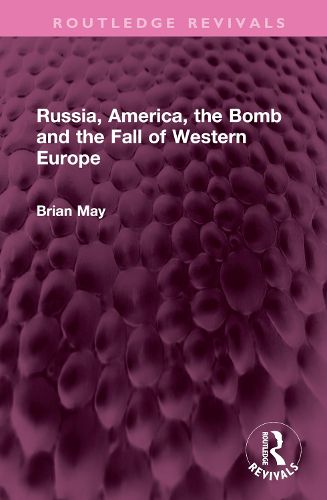Readings Newsletter
Become a Readings Member to make your shopping experience even easier.
Sign in or sign up for free!
You’re not far away from qualifying for FREE standard shipping within Australia
You’ve qualified for FREE standard shipping within Australia
The cart is loading…






First published in 1984, Russia, America, the Bomb and the Fall of Western Europe offers a dual approach to unilateral nuclear disarmament. While it systematically analyzes and rejects stock arguments for retaining nuclear weapons, from the supposed threat of Soviet invasion to fears of Finlandization and the loss of mineral resources, it examines the issue within the context of Western Europe's historic fall. This is described with the help from Arnold Toynbee, Plato and Marx. Brian May argues that, if West European civilization is to survive, it must find the moral strength to stand on its own feet, make its own accommodation with the USSR, and abandon dependence on its offshoot on the other side of the Atlantic, whose policies could lead to its destruction. This book will be of interest to students of geopolitics, international relations, security studies and history.
$9.00 standard shipping within Australia
FREE standard shipping within Australia for orders over $100.00
Express & International shipping calculated at checkout
First published in 1984, Russia, America, the Bomb and the Fall of Western Europe offers a dual approach to unilateral nuclear disarmament. While it systematically analyzes and rejects stock arguments for retaining nuclear weapons, from the supposed threat of Soviet invasion to fears of Finlandization and the loss of mineral resources, it examines the issue within the context of Western Europe's historic fall. This is described with the help from Arnold Toynbee, Plato and Marx. Brian May argues that, if West European civilization is to survive, it must find the moral strength to stand on its own feet, make its own accommodation with the USSR, and abandon dependence on its offshoot on the other side of the Atlantic, whose policies could lead to its destruction. This book will be of interest to students of geopolitics, international relations, security studies and history.